Victor Ardulov
ACR: A Benchmark for Automatic Cohort Retrieval
Jun 20, 2024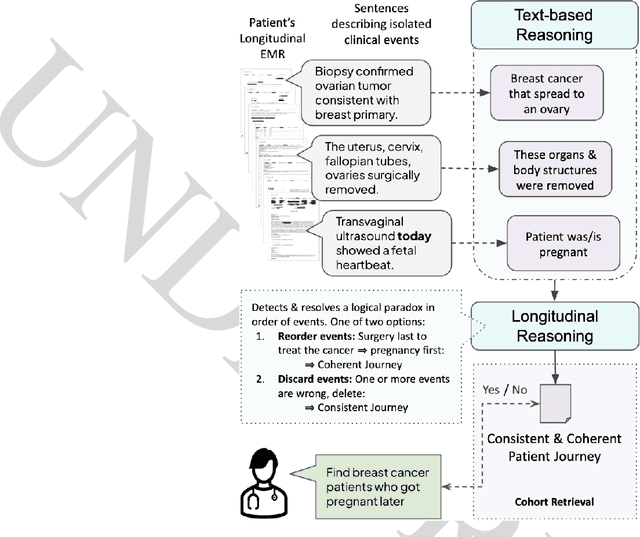
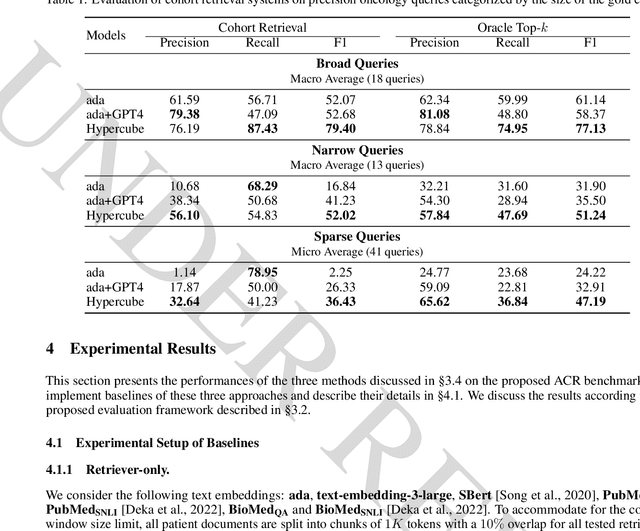
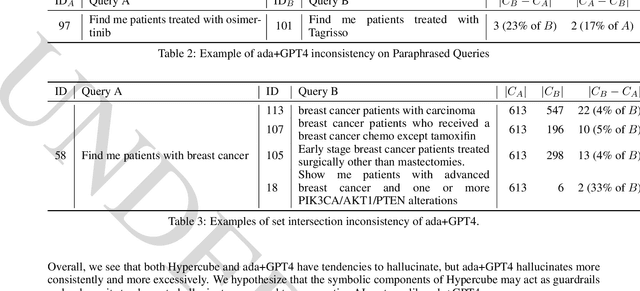
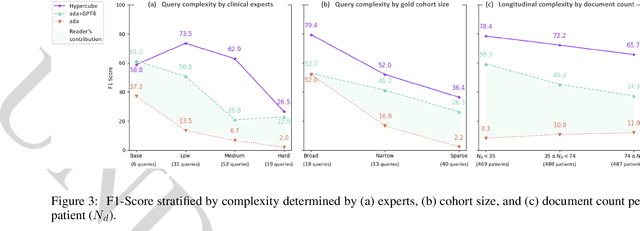
Abstract:Identifying patient cohorts is fundamental to numerous healthcare tasks, including clinical trial recruitment and retrospective studies. Current cohort retrieval methods in healthcare organizations rely on automated queries of structured data combined with manual curation, which are time-consuming, labor-intensive, and often yield low-quality results. Recent advancements in large language models (LLMs) and information retrieval (IR) offer promising avenues to revolutionize these systems. Major challenges include managing extensive eligibility criteria and handling the longitudinal nature of unstructured Electronic Medical Records (EMRs) while ensuring that the solution remains cost-effective for real-world application. This paper introduces a new task, Automatic Cohort Retrieval (ACR), and evaluates the performance of LLMs and commercial, domain-specific neuro-symbolic approaches. We provide a benchmark task, a query dataset, an EMR dataset, and an evaluation framework. Our findings underscore the necessity for efficient, high-quality ACR systems capable of longitudinal reasoning across extensive patient databases.
"Am I A Good Therapist?" Automated Evaluation Of Psychotherapy Skills Using Speech And Language Technologies
Feb 22, 2021
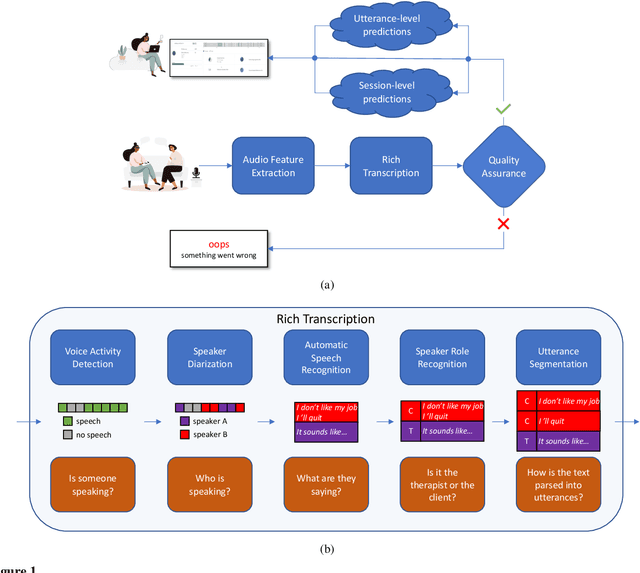
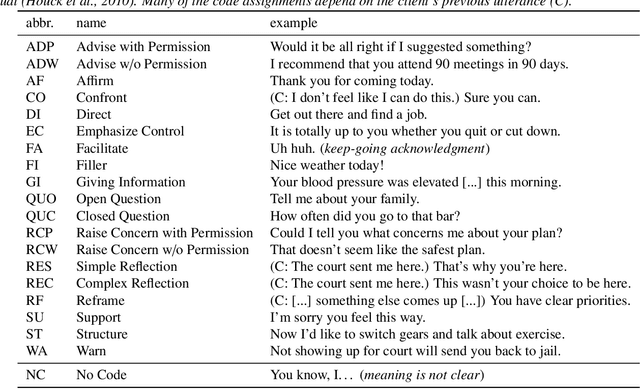
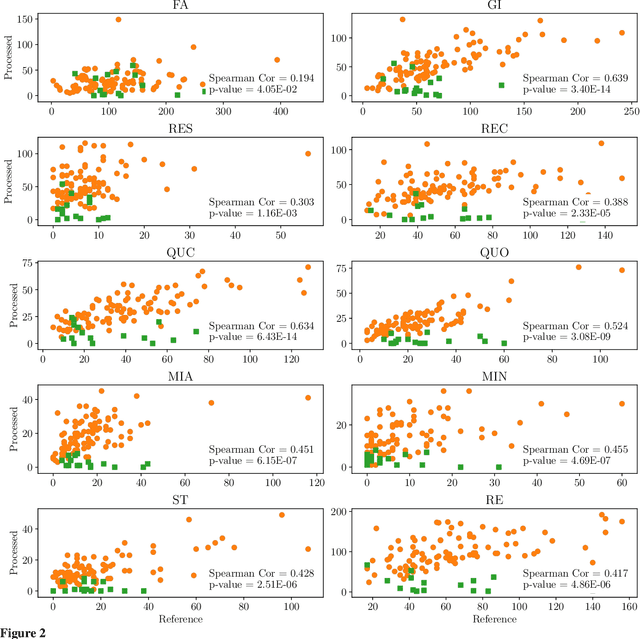
Abstract:With the growing prevalence of psychological interventions, it is vital to have measures which rate the effectiveness of psychological care, in order to assist in training, supervision, and quality assurance of services. Traditionally, quality assessment is addressed by human raters who evaluate recorded sessions along specific dimensions, often codified through constructs relevant to the approach and domain. This is however a cost-prohibitive and time-consuming method which leads to poor feasibility and limited use in real-world settings. To facilitate this process, we have developed an automated competency rating tool able to process the raw recorded audio of a session, analyzing who spoke when, what they said, and how the health professional used language to provide therapy. Focusing on a use case of a specific type of psychotherapy called Motivational Interviewing, our system gives comprehensive feedback to the therapist, including information about the dynamics of the session (e.g., therapist's vs. client's talking time), low-level psychological language descriptors (e.g., type of questions asked), as well as other high-level behavioral constructs (e.g., the extent to which the therapist understands the clients' perspective). We describe our platform and its performance, using a dataset of more than 5,000 recordings drawn from its deployment in a real-world clinical setting used to assist training of new therapists. We are confident that a widespread use of automated psychotherapy rating tools in the near future will augment experts' capabilities by providing an avenue for more effective training and skill improvement and will eventually lead to more positive clinical outcomes.
Feature Fusion Strategies for End-to-End Evaluation of Cognitive Behavior Therapy Sessions
May 15, 2020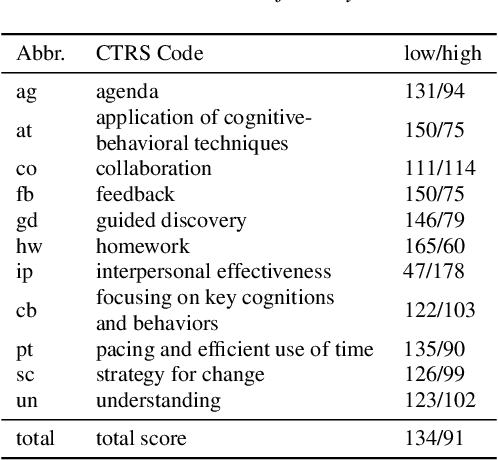
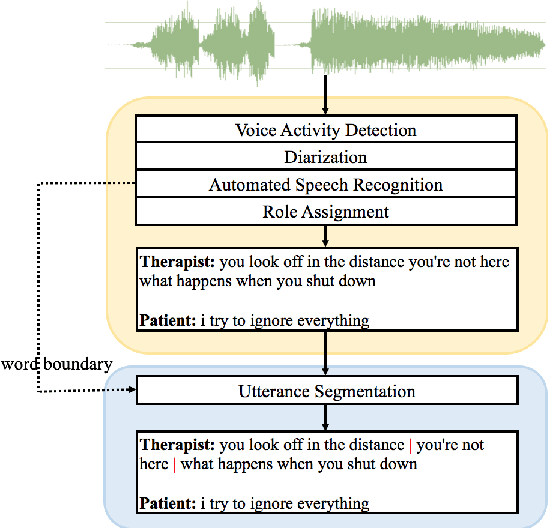
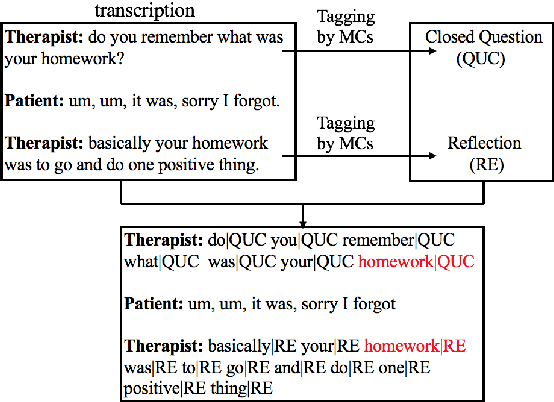
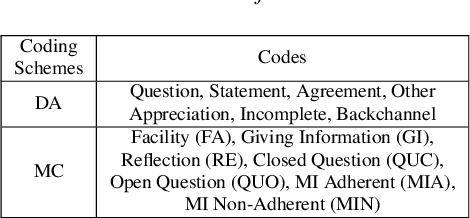
Abstract:Cognitive Behavioral Therapy (CBT) is a goal-oriented psychotherapy for mental health concerns implemented in a conversational setting with broad empirical support for its effectiveness across a range of presenting problems and client populations. The quality of a CBT session is typically assessed by trained human raters who manually assign pre-defined session-level behavioral codes. In this paper, we develop an end-to-end pipeline that converts speech audio to diarized and transcribed text and extracts linguistic features to code the CBT sessions automatically. We investigate both word-level and utterance-level features and propose feature fusion strategies to combine them. The utterance level features include dialog act tags as well as behavioral codes drawn from another well-known talk psychotherapy called Motivational Interviewing (MI). We propose a novel method to augment the word-based features with the utterance level tags for subsequent CBT code estimation. Experiments show that our new fusion strategy outperforms all the studied features, both when used individually and when fused by direct concatenation. We also find that incorporating a sentence segmentation module can further improve the overall system given the preponderance of multi-utterance conversational turns in CBT sessions.
Measuring Conversational Productivity in Child Forensic Interviews
Jun 08, 2018



Abstract:Child Forensic Interviewing (FI) presents a challenge for effective information retrieval and decision making. The high stakes associated with the process demand that expert legal interviewers are able to effectively establish a channel of communication and elicit substantive knowledge from the child-client while minimizing potential for experiencing trauma. As a first step toward computationally modeling and producing quality spoken interviewing strategies and a generalized understanding of interview dynamics, we propose a novel methodology to computationally model effectiveness criteria, by applying summarization and topic modeling techniques to objectively measure and rank the responsiveness and conversational productivity of a child during FI. We score information retrieval by constructing an agenda to represent general topics of interest and measuring alignment with a given response and leveraging lexical entrainment for responsiveness. For comparison, we present our methods along with traditional metrics of evaluation and discuss the use of prior information for generating situational awareness.
 Add to Chrome
Add to Chrome Add to Firefox
Add to Firefox Add to Edge
Add to Edge